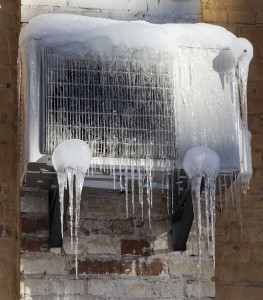 Problems with your heat pump freezing up can occur at any time of year, and any number of factors can be the root cause. While standard troubleshooting techniques can correct simple issues, serious causes need to be addressed by an HVAC professional. A few tips can help you to determine the best steps to take when you next experience a heat pump freeze up.
Problems with your heat pump freezing up can occur at any time of year, and any number of factors can be the root cause. While standard troubleshooting techniques can correct simple issues, serious causes need to be addressed by an HVAC professional. A few tips can help you to determine the best steps to take when you next experience a heat pump freeze up.
It can be helpful to first determine if there are factors unrelated to the HVAC system itself that could be causing the issue. Leaky gutters and freezing rain, for instance, can obstruct airflow and cause problems with the system. Leaves, branches or piles of snow can also block proper airflow. Poor drainage or a settled concrete slab might allow the accumulation of water in the condensing unit. Inside blockages of air ducts by furniture and clogged filters can also restrict airflow enough to cause freezing of the heat pump.
When indirect causes are ruled out, factors relating to the unit itself should be considered. Low refrigerant levels, for example, could be an issue. Fan motor damage or a malfunction can also cause a heat pump to freeze up. The valve operation of the unit could be faulty, or there could be an electronic problem that requires repair. An HVAC technician might also need to inspect the unit for mechanical failures.
Note that a thin layer of frost is normal, but a thicker coating of ice on your heat pump coils will require the help of a professional. An HVAC technician can ensure proper functioning of the controls that are supposed to manage defrost operations. If the heat pump is covered completely with ice or frost, it should be shut off immediately. Your HVAC expert should be consulted as soon as possible. Leaving significant issues uncorrected can cause further damage and lead to higher repair costs later.
Regular attention to the unit and the conditions that affect it can help to keep it running smoothly after problems have been corrected. Keeping airflow unrestricted is helpful, and replacing dirty filters is also beneficial. Follow us for more articles that will keep your heating and cooling systems running efficiently.
